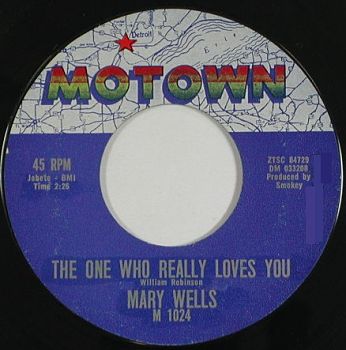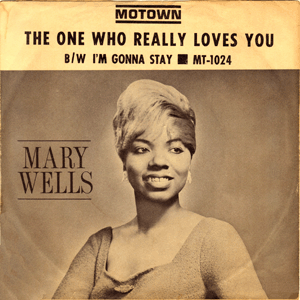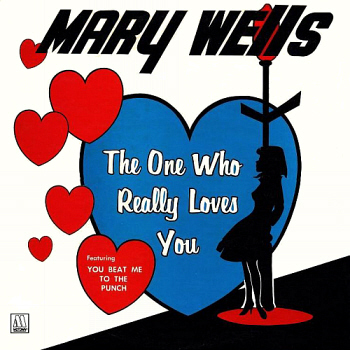Tags
 Motown M 1024 (A), February 1962
Motown M 1024 (A), February 1962
b/w I’m Gonna Stay
(Written by Smokey Robinson)
 Each successive single from Mary Wells, Motown’s first bona fide solo star, had been getting progressively better. It’s hardly as if she’d started right at the bottom of the scale, either; her three singles to date, Bye Bye Baby, I Don’t Want To Take A Chance, and the mesmerising Strange Love, already added up to a body of work anyone could be justly proud of.
Each successive single from Mary Wells, Motown’s first bona fide solo star, had been getting progressively better. It’s hardly as if she’d started right at the bottom of the scale, either; her three singles to date, Bye Bye Baby, I Don’t Want To Take A Chance, and the mesmerising Strange Love, already added up to a body of work anyone could be justly proud of.
Now, at the start of 1962, paired for the first time with writer/producer Smokey Robinson, she turned in her best so far. Not coincidentally, The One Who Really Loves You landed Mary her biggest hit to date (Top Ten pop, and just missing out on scoring Motown’s third R&B Number One).
This was Motown’s fourth year of existence, and another trend was also starting to develop which would become a label hallmark during the company’s mid-Sixties Golden Age: preferential treatment in the studio for the company’s premier acts. Mickey Stevenson had been tasked with doing a huge, lush production on Mary’s last single, Strange Love, and no expense had been spared in getting the best sound possible. When that record had bombed, Motown head honcho Berry Gordy wasted no time in assigning Mary Wells to a different writer/producer – not just any writer, but Smokey Robinson, firmly established as the label’s top creative man – and again greenlighting an expensive production to get her career back on track.
It worked, because this sounds fantastic.
Opening with a burst of three increasingly loud drumbeats – a kind of early fade-in, presaging the Supremes’ Come See About Me two and a half years later – and then picking up with a strange quasi-calypso tempo, a stop-time guitar/bass riff, bongos and drums in tandem, along with an understated, perfectly-timed crash of cymbals, the record grabs the attention straight from the off. Meanwhile, the well-judged male backing vocals add a fresh new element, picking up a sort of echo in the second verse – only wants you until the DAY-yyy – which is pretty much irresistible.
(So beguiling is the mix of ingredients that it takes a couple of lines before you notice the glaring similarity to Little Eva’s international mega-hit The Loco-Motion – but that didn’t even exist yet, not being released until June of 1962. Far be it from me to suggest Goffin and King had listened to this Mary Wells track first, or anything.)
Anyway. Those male backing vocals come courtesy of the magnificent new male “house singers”, the Love-Tones, who were in the process of systematically replacing the Rayber Voices as Motown’s go-to off-the-peg backing vocalists of choice; the male counterparts to the legendary Andantes and precursors of the Originals. Unlike those two groups, the Love-Tones never actually got a Motown single under their own name (though the Andantes one was a weird case in any event – more of which much, much later – and see Robb Klein’s comments on the Ecuadors’ Someone To Call My Own (at the bottom of the page) for more on the Love-Tones’ possible moment in the sun, of sorts), but they did rack up a bunch of label credits, getting their first one here.
The early Funk Brothers are starting to find their best form here; while Smokey throws tempo and key changes at them to keep everyone on their toes (that odd break from the start of the song actually comes back in at the end of each line in the verses, in a deceptively complex rhythm structure), the band pulls it off with an air of effortlessness, almost every time. (There’s a tiny breakdown in tempo on the drum fill just before the middle eight, but the one coming out of it sounds perfect). Everything about the record is done with precision and loving care, but special mention has to go to the fluid, melodic bass, James Jamerson further honing his craft year on year.
 The song itself is one of Smokey’s best to date, pulling in everything he’d learned from a series of increasingly complicated and advanced Miracles numbers and putting it all to splendidly good use. Lyrically, too, it’s highly affecting, despite being simplistic in the extreme – another future Motown hallmark. It’s not poetry, and it’s been criticised for being almost provocatively basic; but it’s direct, and it rings true. Essentially a plea from Mary asking her much sought-after boyfriend to stop chasing after other women who have been “filling his head with jive” (a kind of lyrical opposite of Mary’s later signature tune My Guy, where it was Mary who was in demand). Instead of a hectoring “eyes front, mister” demand to her errant bloke, she instead opts for the “you’ve got it good already” angle, making it clear that she’s prepared to let it go, but it’ll be entirely his fault if things go south: Love, you’d better wake up / Yeah, before we break up, and you lose me / Look to me, the one who really loves you… Obviously coached by Smokey, her cadences very similar to his even though their voices are nothing alike, the effect is entrancing.
The song itself is one of Smokey’s best to date, pulling in everything he’d learned from a series of increasingly complicated and advanced Miracles numbers and putting it all to splendidly good use. Lyrically, too, it’s highly affecting, despite being simplistic in the extreme – another future Motown hallmark. It’s not poetry, and it’s been criticised for being almost provocatively basic; but it’s direct, and it rings true. Essentially a plea from Mary asking her much sought-after boyfriend to stop chasing after other women who have been “filling his head with jive” (a kind of lyrical opposite of Mary’s later signature tune My Guy, where it was Mary who was in demand). Instead of a hectoring “eyes front, mister” demand to her errant bloke, she instead opts for the “you’ve got it good already” angle, making it clear that she’s prepared to let it go, but it’ll be entirely his fault if things go south: Love, you’d better wake up / Yeah, before we break up, and you lose me / Look to me, the one who really loves you… Obviously coached by Smokey, her cadences very similar to his even though their voices are nothing alike, the effect is entrancing.
 There is a slightly clunky bit in the middle eight where Mary runs through a list of her rivals’ character flaws, with their names seemingly chosen simply for scansion – Jenny, Minnie, Silly Lilly and so on – but even then, it scans so well, and Mary carries it off so confidently, that you barely notice; you’re agreeing with her. Or, more accurately, you’re asking the object of her affections just what the heck is wrong with him, because he’d have to be insane to be messing Mary Wells around like this.
There is a slightly clunky bit in the middle eight where Mary runs through a list of her rivals’ character flaws, with their names seemingly chosen simply for scansion – Jenny, Minnie, Silly Lilly and so on – but even then, it scans so well, and Mary carries it off so confidently, that you barely notice; you’re agreeing with her. Or, more accurately, you’re asking the object of her affections just what the heck is wrong with him, because he’d have to be insane to be messing Mary Wells around like this.
Once again, then, Mary is the star, and she makes this her own. She has to take a lot of the credit for this record’s expansive, professional sound, as she excels herself here. Mary tones down the operatics in her voice and turns in a sassy, knowing performance, full of emotion and smoky (no pun intended) jazz-inflected character, Smokey cannily making sure not to downplay the innate sensuality in her voice without descending into a gross sexualized caricature à la Buttered Popcorn. She was still only eighteen, but she sounds both worldly and experienced; she’s come on so far since her début that playing this back-to-back with Bye Bye Baby, you’d think five years had passed between the two records.
With the success of this single, Mary was firmly established not only as Motown’s biggest solo star, but as a regular Top Ten chart act in her own right. She’d remain in the care of Smokey Robinson for the rest of her remaining two and a half years with the company, racking up a series of classic singles – of which this should be counted one of the first.
MOTOWN JUNKIES VERDICT
(I’ve had MY say, now it’s your turn. Agree? Disagree? Leave a comment, or click the thumbs at the bottom there. Dissent is encouraged!)
You’re reading Motown Junkies, an attempt to review every Motown A- and B-side ever released. Click on the “previous” and “next” buttons below to go back and forth through the catalogue, or visit the Master Index for a full list of reviews so far.
(Or maybe you’re only interested in Mary Wells? Click for more.)
 |
 |
| Henry Lumpkin “Don’t Leave Me” |
Mary Wells “I’m Gonna Stay” |


Couldn’t agree more. This is one of the premier Motown singles, surprising in that it comes early in the label’s history. Interestingly, I’m not aware that it’s ever been covered, at least not successfully.
LikeLike
Thanks Nikatnyte.
In terms of Motown covers, the Marvelettes and Barbara McNair did both give it a go, though neither version is much cop (in my humble opinion); once you’ve heard Mary’s, I think any other version would be superfluous.
(If you ever need to know whether something was ever covered on Motown in future, you need look no further than Keith Hughes’ amazing Don’t Forget The Motor City online discography-by-song.)
I’m not sure if Mary revisited this during her 80s Motorcity sessions – but I don’t want to look it up, just in case she did, because then I’d have to listen to some ghastly “new” version and I don’t wan’t to tarnish this record by hearing it.
LikeLike
I heard the Marvelettes’ version first and find that Gladys Horton does great with it. The Marvelettes’ backing vocals are a little shrill (no surprise; but is it really them?), though, and they sound almost out of place considering that The Love-Tones’ original backing vocals are still on the track. But Gladys shows she can be just as seductive as Mary Wells or anyone else at Motown.
LikeLike
Conspiracy Time! 🙂
Who are the female voices on The Marvelettes cover of “The One Who Really Loves You”?
My theory: The Supremes (or at least one of them)
My reasoning: The most prominent female vocal sounds not unlike a young Diana Ross.
What do you think?
LikeLike
Actually, if I was going to pick the watershed moment when the really fine singles started appearing one after the other, more than one per month, this would be the moment. At this point, it seems like the company finally had the depth of talent needed to produce quality product apace. Smokey had already found his voice with Bad Girl, but now So had Mary Wells, The Marvellettes, Marvin Gaye, and with Dream Come True, so would The Temptations. The beginning of 62 really is the moment.
IMHO
LikeLike
Interesting; I don’t know if I’d agree that there was ever a “turning point” for consistent success quality-wise, rather than commercially, but it’s an interesting concept.
(Also, I don’t think “Dream Come True” – magnificent though it is, obviously – sounds anything like the mid-Sixties Temptations at all, and I mean their voices, not the style of the material, but that’s for another day.)
This really is pretty great, though.
LikeLike
As usual I agree with you on both points.
1. Yeah, there is not really any magic moment, the complete singles makes the progressive evolutionary nature of the “motown sound” quite clear.
My real point was my second one, namely that although most of the greatest acts were producing by 61, only Smokey had his mature style in place, the others, fine tracks notwithstanding, were still searching. But in 62 all of these acts seemed to find their signature style. The 2. Yeah, I was referring to the style of the track, not the vocal sound, which changed every couple of years. I look forward to ongoing comments of the Tempts evolution.
LikeLike
This song came out before Heat Wave utterly demolished the fortress of my hostility to pop music, but it certainly helped prepare the way. My soundtrack was Verdi and Mahler, but there was a surreptitious counterpoint under the surface, which would emerge explosively within a few months… growing up in southern New Jersey, near Philadelphia, these songs were inescapable, and I was just waiting to be seduced. For me this is a 10; I can’t conceive of wanting the slightest change, even Silly Lilly (with that marvelous rhyme with ‘really’…); Mary Wells’ promise (no other girl in the whole wide world) was both threatening and irresistible.
LikeLike
This is another had to have the 45 to when I first heard it as a teenager in the 80s. I’m 46 now and my 10 year old daughter loves Mary Wells records.
LikeLike
The beginnings of the Mary Wells -Smokey Robinson combos , The One Who Really Loves You is a very infectious tune you’ll love the first couple seconds you hear it. Perfection! 10/10
LikeLike
Great assessment. Love this song. Lyrical quibble: It’s “…and you lose me / little me…”
LikeLike
You’re right (though it’s only really audible on Barbara McNair’s version). I wish you weren’t, I think the “wrong” version I’ve been hearing all these years is much better!
LikeLike
I would rate this a 10 because it’s my favorite Mary Wells song, easily.
LikeLike
Wow! You’re saying this came BEFORE “Do the Loco-motion”? Carole should have forgiven the “Tomorrow & Always” debacle. I mean … legally I don’t think a suit could be won against Loco-motion. It’s the good kind of “nicking”, but still, Tomorrow & Always barely charted and Loco-motion went to #1 in three different decades with three different artists.
Now, what about the line a little later – “love you better wake up, yeah, before we break up and you lose me” – that part is similar to a Bacharach song that’s right on the tip of my tongue – I wonder if this predates that as well. Looks like the Dione Warwick/Bacharach period didn’t start until 1962 … hmmmm. In any case, I agree with 9/10, or even 10/10.
This site/eBook is like a page-turner mystery – we’re at the onset of 1962 and between Motown, the Beatles, Bacharach, Brian Wilson and so many others, the world of pop harmony and melody is about to explode into a technicolor fireworks show. It’s so fascinating to see precisely the order these masterpieces came in.
LikeLike
If Kevin is thinking of “You’ll Never Get To Heaven (If You Break My Heart),” the year is 1964.
LikeLiked by 1 person
If Kevin is thinking of “You’ll Never Get tTo Heaven (If You Break My Heart),” the year is 1964.
LikeLike
I agree completely. It was the first Mary song I heard, and as with “Postman”, I
could never go back. You mentioned “Loco-Motion”, so did you notice the likeness to
“My Daddy Knows Best”, too?
LikeLiked by 1 person